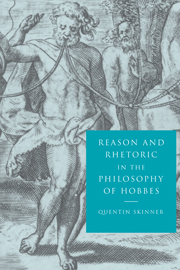Book contents
- Frontmatter
- Contents
- Acknowledgments
- Notes on the text
- Introduction
- PART I CLASSICAL ELOQUENCE IN RENAISSANCE ENGLAND
- PART II HOBBES AND THE IDEA OF A CIVIL SCIENCE
- 6 HOBBES'S EARLY HUMANISM
- 7 HOBBES'S REJECTION OF ELOQUENCE
- 8 HOBBES'S SCIENCE OF POLITICS
- 9 HOBBES'S RECONSIDERATION OF ELOQUENCE
- 10 HOBBES'S PRACTICE OF RHETORIC
- Conclusion: Why did Hobbes change his mind?
- Bibliographies
- Index
6 - HOBBES'S EARLY HUMANISM
Published online by Cambridge University Press: 08 February 2010
- Frontmatter
- Contents
- Acknowledgments
- Notes on the text
- Introduction
- PART I CLASSICAL ELOQUENCE IN RENAISSANCE ENGLAND
- PART II HOBBES AND THE IDEA OF A CIVIL SCIENCE
- 6 HOBBES'S EARLY HUMANISM
- 7 HOBBES'S REJECTION OF ELOQUENCE
- 8 HOBBES'S SCIENCE OF POLITICS
- 9 HOBBES'S RECONSIDERATION OF ELOQUENCE
- 10 HOBBES'S PRACTICE OF RHETORIC
- Conclusion: Why did Hobbes change his mind?
- Bibliographies
- Index
Summary
HOBBES'S HUMANIST CAREER
Thomas Hobbes died at Hardwick Hall in Derbyshire on 4 December 1679. By that time the Royal Society had been incorporated for nearly twenty years, and many of the most celebrated English contributions to the scientific revolution had been in print for a generation or more. William Harvey had published his findings about the circulation of the blood in his Exercitatio Anatomica in 1628. John Napier, Isaac Barrow and John Wallis had all completed their most important mathematical work by the middle years of the century, Napier first announcing his discovery of logarithms as early as 1614. William Gilbert's De Magnete had appeared even earlier, while Robert Boyle began his physical experiments in the course of the 1640s, eventually publishing his proof of the phenomenon still known as Boyle's law in the second edition of his New Experiments Physico-Mechanical Touching the Air in 1662.
Hobbes not only lived long enough to learn about all these discoveries, but also to take an active part in debating their significance. He discusses Gilbert's claim that the earth is a magnet in the course of his lengthy manuscript of 1642–3 on Thomas White's De mundo, a work in which he also voices for the first time his partially sceptical views about the idea of a vacuum. He held numerous meetings with Harvey in the early 1650s and refers admiringly to Harvey's work in the epistle dedicatory to the English version of De Corpore as a rare instance of a new scientific theory becoming universally accepted during its author's own lifetime.
- Type
- Chapter
- Information
- Reason and Rhetoric in the Philosophy of Hobbes , pp. 215 - 249Publisher: Cambridge University PressPrint publication year: 1996
- 1
- Cited by



